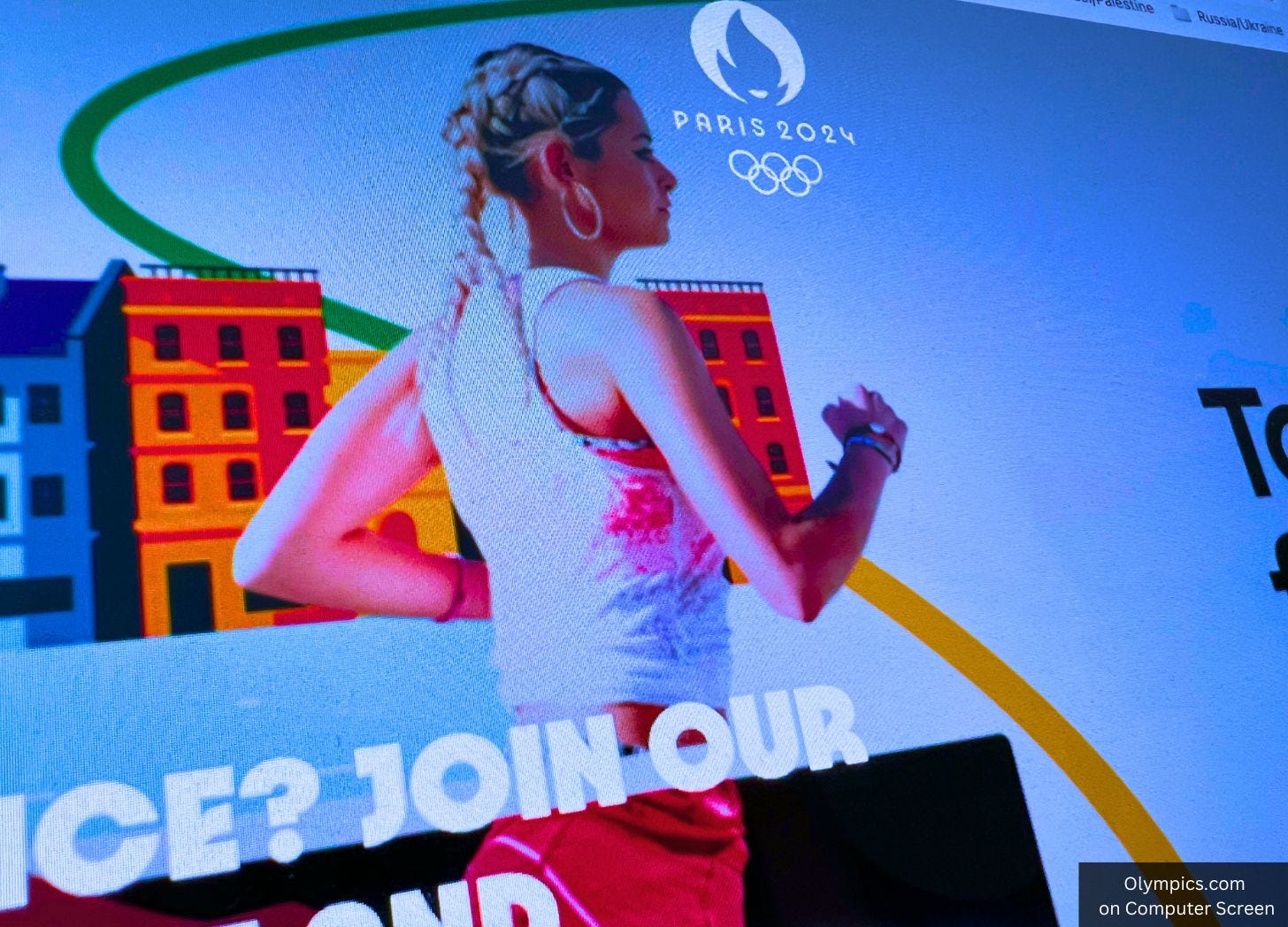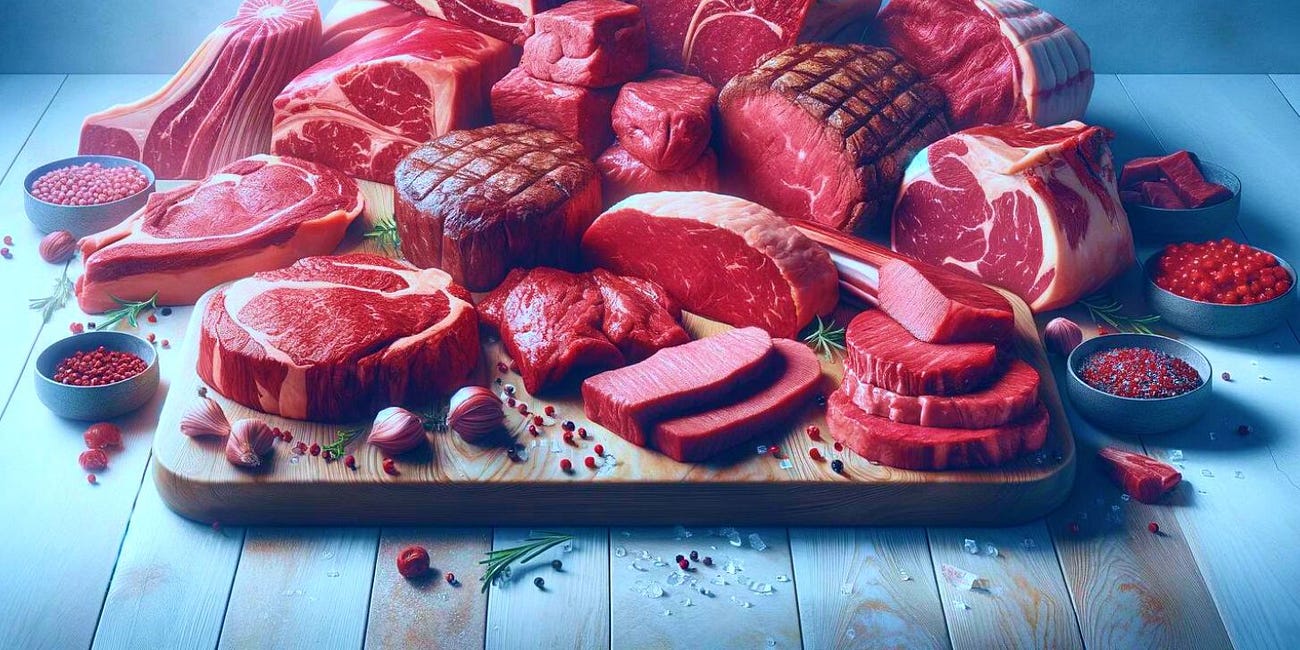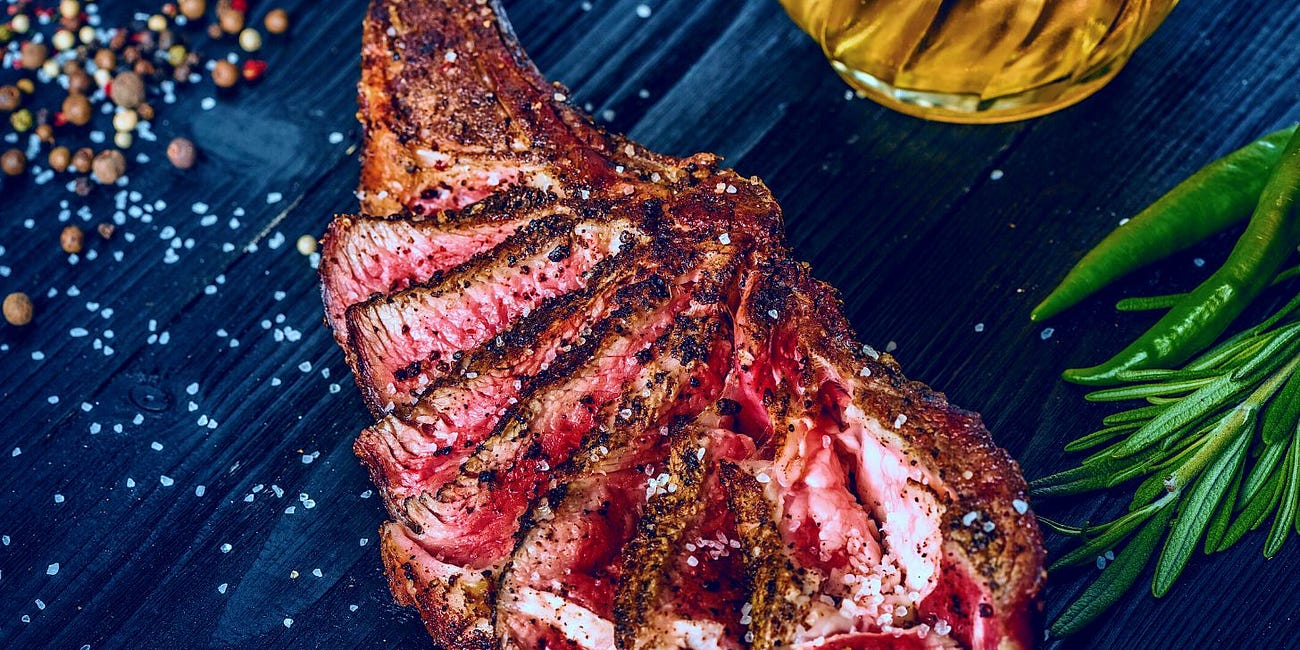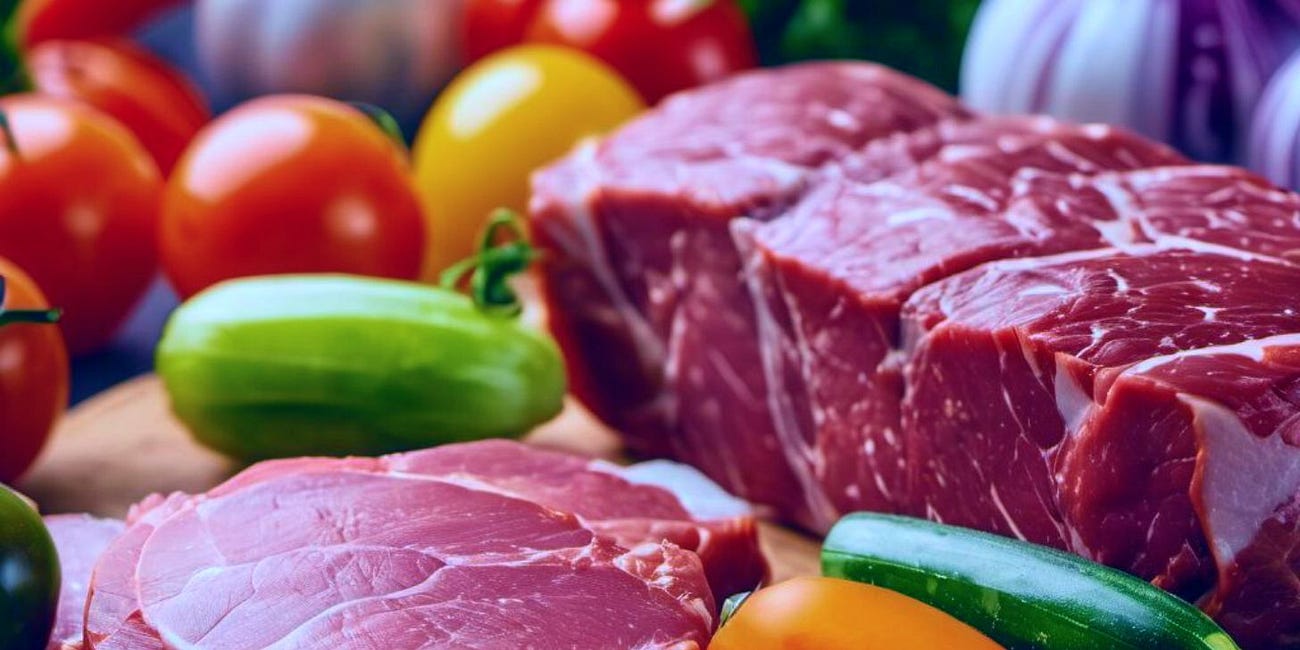Olympians Demand More Animal Protein, Call 'Climate-Friendly' Vegan-Based Food in Paris a 'Disaster'
The fittest humans in the world prioritize meat, not vegetables.
Amid the 2024 Olympics currently underway in Paris, France, participating athletes are complaining about the lack of animal protein being served at the Olympic Village.
Follow Jon Fleetwood: Instagram @realjonfleetwood / Twitter @JonMFleetwood / Facebook @realjonfleetwood
The development reveals the nutrition habits of the fittest humans in the world, giving us non-Olympians a clue as to what we should eat if we want a body as healthy and strong as theirs.
Elite athletes competing in the Paris Games are rejecting the “climate-friendly,” vegan-oriented food options and calling for more eggs and meat.
The U.K. team has even resorted to flying in another private chef to Paris “because of a lack of protein and because of raw meat being served at the Olympic Village,” Business Insider reports.
The Paris Olympics are “running low on chicken and egg options” and athletes are “choosing to eat packed meals prepared at the UK performance lodge.”
British Olympic Association’s chief executive Andy Anson commented that the food “is not adequate,” according to The Washington Post.
“There are not enough of certain foods: eggs, chicken, certain carbohydrates, and then there is the quality of the food, with raw meat being served to athletes,” Anson added.
Members of Germany’s men’s hockey team called the Paris 2024 cuisine “a disaster.”
Norway’s chef de mission, Tore Ovrebo, also slammed the food choices, quipping that “there’s been a little bit to say about the quality.”
In response, organizers have added over 1,500 pounds of animal protein to the menu.
Étienne Thobois, the CEO of the Paris 2024 Games, acknowledged that organizers “had to make some adjustments,” including adding “700 kilos of eggs and a ton of meat.”
Follow Jon Fleetwood: Instagram @realjonfleetwood / Twitter @JonMFleetwood / Facebook @realjonfleetwood
The Olympic Village initially promised more local produce and vegetarian options, but these were not popular among the roughly 15,000 competing athletes.
Olympian bodies require animal protein.
“Certain products, such as eggs and grilled meats, are particularly popular among athletes, so their quantities were increased, in agreement with Paris 2024,” Olympics catering company Sodexo Live told Business Insider. “Since then, the quantities offered for these products were adapted accordingly and have been sufficient to meet all needs.”
The New York Post reports 44% of endurance runners stick to omnivorous diets, compared to 34% vegan and 20% vegetarian ones.
The Post also relayed how “both male and female omnivorous runners were reported as having better average times compared to their vegan and vegetarian counterparts.”
Some athletes sounded off on the food available in Paris.
Per The Post:
Ariarne Titmus, who won gold in the women’s 400-meter freestyle on Saturday, seemingly attributed posting a slower time than she anticipated in part due to the less authentic cuisine.
“It probably wasn’t the time I thought I was capable of, but living in the Olympic Village makes it hard to perform,” the 23-year-old said, according to the Daily Mail. “It’s definitely not made for high performance, so it’s about who can really keep it together in the mind.”
Another former Australian swimming standout also took exception to Sodexo Live, the Village’s designated food provider, for opting for a menu devoid of more traditional meats and proteins.
“The lack of world records boils down to this whole eco-friendly, carbon footprint, vegan-first mentality rather than high performance,” said James Magnussen, who last won a swimming bronze medal for Australia in 2016.
The Aussie also quipped that caterer Sodexo Live may have erred in its estimation about the proportion of athletes who prefer vegan diets.
“The caterer had to rejig their numbers and bring in more of those products because surprise, surprise — world class athletes don’t have vegan diets,” Magnussen said. “They must have watched the Netflix doc ‘Game Changers’ and assumed everyone was the same. But let me tell you, Usain Bolt, Michael Phelps, Roger Federer — none of those guys are on a vegan diet.”
That the fittest humans prioritize aminal protein calls into question the mainstream assumption that vegetarian diets are optimal for our health.
Follow Jon Fleetwood: Instagram @realjonfleetwood / Twitter @JonMFleetwood / Facebook @realjonfleetwood
The false notion that meat is inherently bad for us is being pushed throughout the world by The World Economic Forum (WEF).
The Forum’s programs are currently advancing worldwide the climate change narrative, as well as the idea that China will be the next world superpower, Diversity, Equity, and Inclusion (DEI) efforts, and population management.
The globalist group, founded in 1971, accomplishes this by partnering with top politicians from around the world, as well as international corporations, legal systems, political activist groups, and the scientific community.
The WEF’s programs are accomplishing what its founder Klaus Schwab calls the “Great Reset,” after which citizens worldwide will “own nothing” and “be happy” about it.
The Forum has vowed that “[y]ou will be eating replacement meats within 20 years.”
The globalist organization recommends we eat insects, demanding we give bugs “the role they deserve in our food systems.”
One WEF publication explains the group’s advocacy for insect consumption is based on its belief that animal protein “is the source of greenhouses gas and climate change.”
“Insects are an overlooked source of protein and a way to battle climate change,” the publication reads. “The consumption of insects can offset climate change in many ways.”
In 2015, the European Food Safety Authority published a risk assessment of using insects as a source of protein for human consumption and animal feed that reported the “potential biological and chemical hazards, as well as allergenicity and environmental hazards, associated with farmed insects used in food and feed taking into account the entire chain, from farming to the final product.”
In 2021, the United Nations’ Food and Agriculture Organization (FAO) detailed the safety and allergy risks associated with insect consumption.
A report by Food Safety News summarizes the FAO’s findings:
Possible food safety hazards for edible insects are biological, including bacteria, viruses, fungi, parasites, chemical hazards including mycotoxins, pesticides, heavy metals, antimicrobials, and physical hazards.
The potential for allergenic risks is also covered with the conclusion being that further investigation is needed. Individuals already allergic to crustaceans are particularly vulnerable to reactions to edible insects because of allergen cross-reactivity. There is also a risk associated with developing sensitization to as yet unidentified allergens from insects.
Safety risks of eating insects depend on the species, the environment they are reared in or collected from, what they eat, and production and processing methods. Assessments of food safety hazards will help to establish good hygiene and manufacturing practices, according to the guide.
Previous research found some reported cases of botulism in Africa attributed to insect consumption and histamine toxicity in Thailand linked to eating fried insects.
The FAO said safe insect production must include efforts to prevent, detect, identify and mitigate food safety concerns. Risks can be higher when insects are harvested from the wild and consumed raw. Safety concerns may vary based on whether insects are from the wild or farmed.
Insects are consumed in their entirety and can accumulate contaminants from feed or housing materials. Because of their small size, it can be difficult to decontaminate harvested insects, and any contamination may be carried along the production and processing chain.
Farming insects under controlled hygienic conditions and implementing sanitary processing techniques should reduce some hazards, such as microbiological contamination, according to the report. The analysis finds that further studies on how to safely rear, handle, harvest, process, store, and transport insects and insect-based products are needed.
Precautions should be taken to ensure that insects do not escape from production facilities. Certain species considered for food and feed are also pests and carriers of foodborne diseases such as cockroaches and houseflies. If the insect species being farmed is not endemic to the area and can survive in nature if it escaped, then it is likely to impact the local ecosystem.
Further research is needed to establish shelf-stability and safety of insect-based products used in human food and animal feed. Data on insect consumption by humans will improve understanding of the possible exposure to contaminants, both microbiological and chemical.
Follow Jon Fleetwood: Instagram @realjonfleetwood / Twitter @JonMFleetwood / Facebook @realjonfleetwood
Harvard Psychiatrist Challenges Vegan Trend, Insists Meat Is Essential for Brain Health
In a striking blow to prevailing dietary trends that favor veganism, Dr. Georgia Ede, a nutritional and metabolic psychiatrist with training from Harvard, asserts that animal products are crucial for mental health.
'Meat-Free' Diet in Preschool Children Increases Obesity Risk: Journal 'Obesity Science & Practice'
A study published in August in the peer-reviewed scientific and medical journal Obesity Science & Practice has revealed that meat-free diets in schoolchildren are linked to higher rates of obesity.
Nutrient Found in Meat Could Treat Alzheimer's Disease: Journal 'Current Developments in Nutrition'
A November study published in Current Developments in Nutrition found a link between creatine supplementation and improvement in Alzheimer’s disease (AD).
Meat Allergy in Nearly 2 in 10 COVID Jab Recipients: 'The Journal of Allergy and Clinical Immunology: In Practice'
A study published Thursday in The Journal of Allergy and Clinical Immunology: In Practice has revealed a surprising prevalence of alpha-gal sensitization among recipients of the COVID-19 injection in central Virginia.
Pork Peril: RNA Vaccine Injected Into U.S. Pork Livestock Kills 1 in 33 Pigs, Raising Meat Safety Concerns
Merck Animal Health received license approval for its ‘Sequivity IAV-S NA’ (Swine Influenza Vaccine, N1, and N2, RNA Particle) pig vaccine from the U.S. Department of Agriculture (USDA) in 2022.
Vegetarians Suffer More COVID-19 Vaccine Adverse Reactions Than Meat Eaters: 'Journal of Family Medicine and Primary Care'
A study published last month in the Journal of Family Medicine and Primary Care confirms vegetarians suffer more adverse reactions following COVID-19 vaccination than meat eaters.
Pentagon Dumps $500 Million Into Lab-Grown 'Meat' Manufacturer BioMADE Tied to World Economic Forum (WEF)
BioMADE, a U.S. research institute focused on advancing bioindustrial manufacturing, announced a substantial budget increase from the U.S. Department of Defense (DOD), raising its federal funds ceiling from $87.5 million to over $500 million.
Farmers Protest Across Europe in Response to World Economic Forum Globalist Agenda: What CNN Won't Tell You (Opinion)
Farmers are holding protests across Europe, blocking streets with tractors, and tossing eggs and manure at government buildings.
The 'WEF Axis' of Evil: How The World Economic Forum Controls Everything You Do
The World Economic Forum (WEF) is behind the global climate change narrative, promoting China as the next world superpower, and worldwide Diversity, Equity, and Inclusion (DEI) efforts.














see what happens when the globalist push their unhealthy diet on professional athletes......when they stood up in protest they are getting the food their body needs in order to perform a their peak. This is also how everyday people need to react when they try this crap on the entire world because it is coming and we need to protest loud and proud.
Wish all athletes would refuse to participate